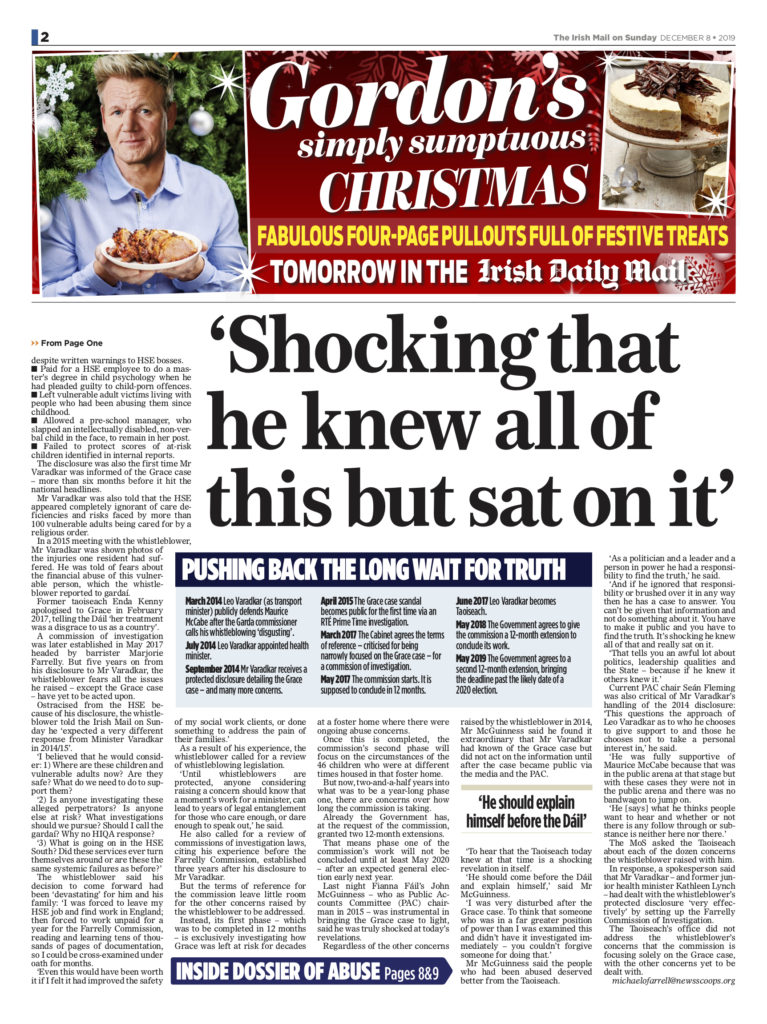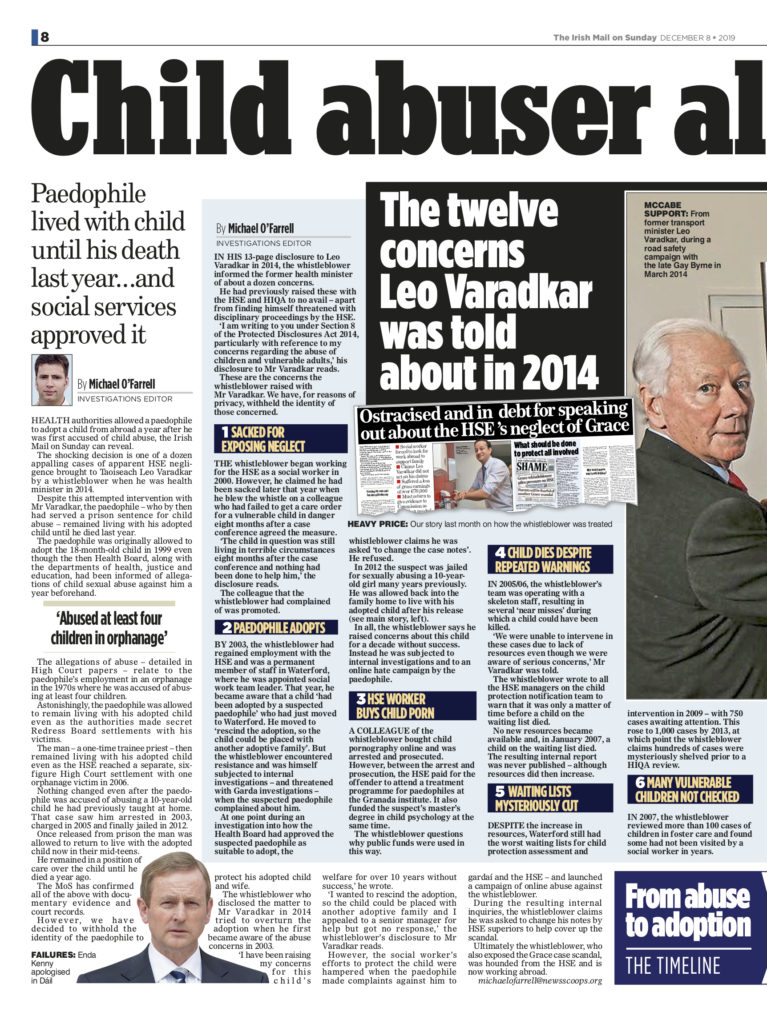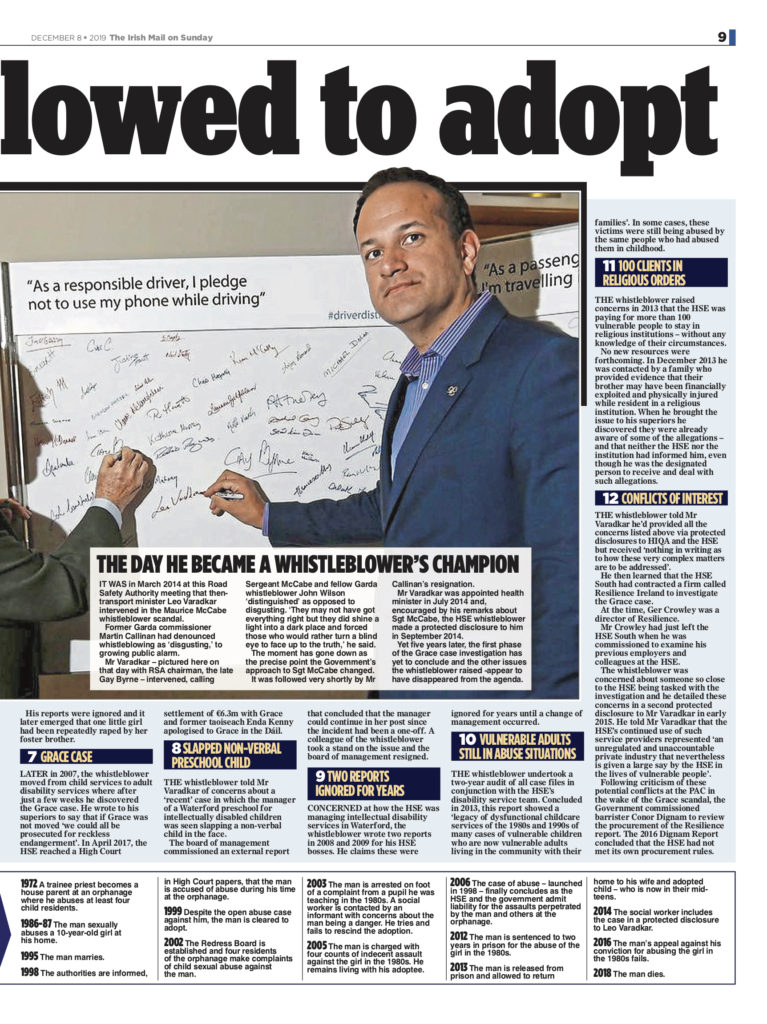By: Michael O’Farrell
Investigations Editor
THE Public Accounts Committee (PAC) will write to the Farrelly Commission in the wake of recent revelations from the HSE whistleblower who first brought the Grace case to the attention of the Taoiseach.
The move comes after the MoS revealed that the whistleblower told Taoiseach Leo Varadkar about the Grace case – and a catalogue of other appalling scandals – in a protected disclosure three years before the Farrelly Commission was established.
Among other things, the disclosure informed Mr Varadkar that the same HSE officials responsible for leaving Grace, an intellectually disabled woman, in the care of a foster family for decades, despite allegations of physical and sexual abuse, had also: ? Allowed a paedophile to adopt and raise a child.
Allowed a vulnerable child in danger to die despite written warnings. Left vulnerable adult victims living with people who had been abusing them since childhood.
But five years on from his disclosure to Mr Varadkar, the whistleblower is now fearful that all the issues he raised – except the Grace case – have been swept under the carpet.
As a result of his experience, the whistleblower is calling for a review of whistleblowing legislation.
‘Until whistleblowers are protected, anyone considering raising a concern should know that a moment’s work for a minister, can lead to years of legal entanglement for those who care enough, or dare enough to speak out,’ he said.
He also called for a review of Commissions of Investigation laws, citing his experience in front of the Farrelly Commission.
The Farrelly Commission was established in May 2017 – three years after the whistleblower made his disclosure to Mr Varadkar.
But the terms of reference for the Commission leave little room for the other concerns raised by the whistleblower to be addressed.
Instead, the Commission’s first phase – which was to be completed in 12 months – is exclusively investigating how Grace was left at risk for decades at a foster home where there were ongoing abuse concerns.
Once this is completed, the Commission’s second phase will focus on the circumstances of the 46 children who were at different times housed in the foster home in question.
But now, two-and-a-half years into what was to be a 12-month phase one, there are concerns about the length of time the Commission is taking.
Already the Government has, at the request of the Commission, granted two 12-month extensions.
That means phase one of the Commission’s work will not now be concluded until at least May 2020 – after an expected general election early next year.
Last night PAC Chairman Sean Fleming confirmed the Committee would meet in the new year with a view to writing to the Farrelly Commission.
He said: ‘It is my intention to raise this at the first meeting of the new year with a view to writing to the Commission for an update.’
Mr Fleming has already been openly critical of the Taoiseach’s handling of the whistleblower’s 2014 disclosure – at a time when he was Health Minister.
So too has former PAC Chairman John McGuinness, who was instrumental in bringing the Grace case to light.
Regardless of the other concerns raised by the whistleblower in 2014, Mr McGuinness said he found it extraordinary that Mr Varadkar had known of the Grace case but did not act on the information until after the case had made headlines.
‘As a politician and a leader and a person in power he had a responsibility to find the truth. And if he ignored that responsibility or brushed over it in any way then he has a case to answer,’ said Mr McGuinness.
Asked about the whistleblower’s criticism of Mr Varadkar, a spokesperson said the Taoiseach could not comment on the ongoing work of the Farrelly Commission.
The spokesperson did not address the whistleblower’s central fear – that many issues he raised with Mr Varadkar are not covered by the Commission’s terms of reference.




